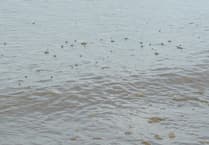THE Government will be kept under the closest scrutiny on the issue of neonicotinoid pesticides, West Somerset’s MP Ian Liddell-Grainger has promised.Mr Liddell-Grainger, who is chairman of the parliamentary cider committee, has also given an assurance that the existing bans on the chemicals will not be removed if fresh evidence shows they should remain.
Neonicotinoids are a relatively new type of insecticide, introduced in the last 20 years to control a variety of pests, especially sap-feeding insects such as aphids on cereals, and root-feeding grubs.
But research is now pointing to the fact that they have had a devastating impact on bee populations, which have dwindled alarmingly in the last few years.
Concerns have led the EU to ban three of the five currently approved neonicotinoids from use on a wide range of crops and the European Food Safety Authority has begun a review of the science relating to neonicotinoids and bees, to which the UK Government is contributing and which is expected to conclude in the summer.
Mr Liddell-Grainger has already joined the all-party parliamentary group for bees, set up a few months ago by Bexhill and Battle MP Huw Merriman.
“It will help me keep abreast of all the latest developments in the debate over an issue which has profound implications for the countryside,” he said.
“Bees play a vital role in the security of our food supply, and losing natural pollinators like them could leave farming and horticulture with costs and losses running into billions of pounds a year.
“They are particularly important in the South West where food production plays such a significant role in the economy and, of course, we have a world-class cider industry which derives so many benefits from the presence of bees in the orchards.”
Mr Liddell-Grainger said the Government had done valuable work over the last few years to over the last few years to study and protect bees, most recently through the National Pollinator Strategy.
“I am aware of the concerns not merely of bee-keepers but of all those who rely on a healthy bee population – and indeed who value our natural environment - but they can rest assured my eye remains firmly on the ball on this issue,” he said.



